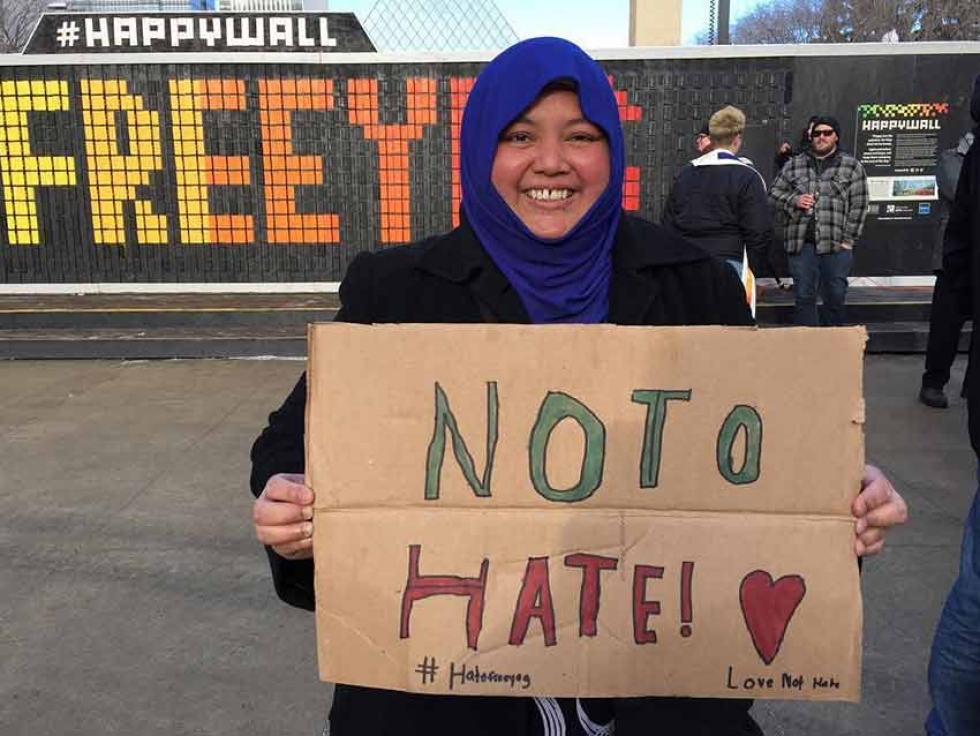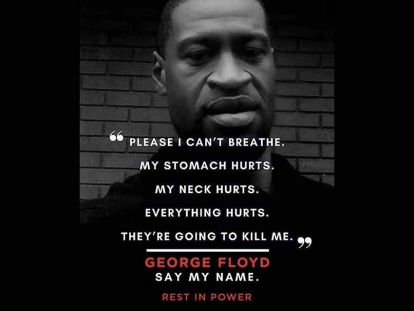 Originally from Singapore, Wati Rahmat volunteers with various social justice initiatives in Edmonton, Alberta.
Photo Credit: Paula E Kirman
Originally from Singapore, Wati Rahmat volunteers with various social justice initiatives in Edmonton, Alberta.
Photo Credit: Paula E Kirman
Feb
A Trauma-Informed Approach to Community Care After Hate Incidents Is Urgently Needed: An Open Letter to Muslim Leaders
Written by Wati RahmatThe Edmonton Muslim community was faced with Islamophobic aggressions within a span of two weeks in late January and early February of 2019. As a growing community of over 40,000 strong adherents or approximately 5.5% of the Edmonton population, this climate of hate rearing its ugly head so fresh into the new year, instills unease as to any potential escalation of Islamophobic acts and/or rhetoric with provisional and federal elections on our doorsteps.
On January 25, 2019, a group of men from the The Clann Northern Alberta Infidel Division, intruded the Ar Rashid Mosque during Friday prayers and intimidated congregants outside the mosque.
On February 6, 2019, we learned that the Markaz Ul-Islam mosque in Millwoods received hate mail, with disturbing content proclaiming “You are a guest here. Don’t overstay your welcome.”
Islamophobic tensions are not new to Edmontonian Muslims. In 2016, the same mosque in Millwoods received anti-Islam flyers and in the same year, two young Muslim women wearing hijabs were handed a noose on an LRT platform.
Last year, the hate group Soldiers of Odin planned a September 11 vigil titled “Infidels against Islam” – which was later cancelled.
Following these troubling incidents, condemnations were usually swift from leaders within the Muslim community as well as politicians and law enforcement. Calls for calm, solidarity and messages of resilience and undeterred stances permeate through the fast news cycle and our social media pages.
The messages were heart-felt and consoling, but something was missing…
This week, I was at a monthly women’s support circle on the south side. My friend would usually leave our session earlier as her daughter attends a religious class at Markaz Ul-Islam. That day, she lingered around and when I asked why, she said that she was keeping her daughter away from the class for a couple of weeks in light of the hateful letter sent to the mosque. I remembered another friend of mine who wrote on Facebook how she was afraid of going to her local mosque after hearing of the intrusion at Ar-Rashid Mosque.
I thought back to efforts made by some non-Muslim allies to offer accompaniment to Muslim women attending services at their local mosque following the January incident. A representative from an anti-hate community group and I separately approached one mosque here to offer this service to its congregants.
The offer was politely turned down with reassurances that Muslim sisters did not need the service and that there was no fear of danger.
This is perplexing to say the least. Anecdotal sentiments on the ground and my own lived experience tell a different story.
I am a South East Asian, brown, hijab-wearing Muslim woman and I am afraid. I am fearful. I have anxieties each time I hear of a hateful incident.
Why then do community leaders insist on pushing this narrative that our community will prevail, that we will continue to lead our “normal” lives, that we will not allow hate to cower us?
There is a definite disconnect between spokespeople in our community and regular Muslims living varied intersectional realities: Black brothers and sisters whose lives are challenging as it is with anti-blackness within our Muslim community and within mainstream society, Muslim youth whose anxieties about identity in two cultures are compounded by attacks on people who look like them, Muslims who are economically disenfranchised and new immigrants who are already anxious in this new environment. The lack of acknowledgement of these vulnerable groups is jarring.
The mosque representative who had turned down the offer for accompaniment and rides by our allies had said that “Our sisters are safe as they come in cars with their families” – a clear disregard for those in our community who take public transit, have mobility issues, and/or who are single.
Why are our fears and vulnerabilities swept under the rug?
Why do we not recognise that there are pockets of our community who are traumatised?
Are we any less resilient if we showcase our fears and accept that there are those among us who need help in our community?
Consultation-based engagement efforts within the Muslim community are much needed. The leaders of Muslim organizations need to realise that their perspective may not accurately reflect other community members from various backgrounds.
The tragic outcome of this inability or short-sightedness is that mental health is never front and centre after any hateful incident. In denying the existence of trauma, community leaders have failed to advocate for and provide mental health resources for Muslims. We need a new approach to handling crisis in our community because unfortunately, Islamophobic incidents will happen again.
Next time, I hope we will take time to address the vulnerable among us. We need to start now to plan for mental health programs which are community sensitive and appropriate. We need trauma-informed crisis-management NOW!
I am speaking from my own lived experience, as an immigrant to Canada, as someone who faces Islamophobic taunts on public transit, while walking on the streets and while grocery shopping in supermarkets. I am sharing my concern as a single mother raising three brown boys to be proud of their heritage while being sensitive to their emotional needs.
My fear is real and should be validated.
Not all of us have to be heroes and heroines.
It is OK to be afraid, it is OK to show vulnerability.
It is OK to seek help and be helped.
It is OK to listen and correct our wrongs before it’s too late.
This article was produced exclusively for Muslim Link and should not be copied without prior permission from the site. For permission, please write to info@muslimlink.ca.













